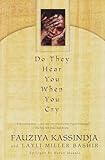
Do They Hear You When You Cry
3 journalers for this copy...
From the Publisher
For Fauziya Kassindja, an idyllic childhood in Togo, West Africa, sheltered from the tribal practices of polygamy and genital mutilation, ended with her beloved father's sudden death. Forced into an arranged marriage at age seventeen, Fauziya was told to prepare for "kakia, " the ritual also known as female genital mutilation. It is a ritual no woman can refuse. But Fauziya dared to try.
This is her story--told in her own words--of fleeing Africa just hours before the ritual "kakia" was to take place, of seeking asylum in America only to be locked up in U.S. prisons, and of meeting Layli Miller Bashir, a law student who became Fauziya's friend and advocate during her horrifying sixteen months behind bars. Layli enlisted help from Karen Musalo, an expert in refugee law and acting director of the American University International Human Rights Clinic. In addition to devoting her own considerable efforts to the case, Musalo assembled a team to fight with her on Fauziya's behalf. Ultimately, in a landmark decision in immigration history, Fauziya Kassindja was granted asylum on June 13, 1996. Do They Hear You When You Cry is her unforgettable chronicle of triumph
For Fauziya Kassindja, an idyllic childhood in Togo, West Africa, sheltered from the tribal practices of polygamy and genital mutilation, ended with her beloved father's sudden death. Forced into an arranged marriage at age seventeen, Fauziya was told to prepare for "kakia, " the ritual also known as female genital mutilation. It is a ritual no woman can refuse. But Fauziya dared to try.
This is her story--told in her own words--of fleeing Africa just hours before the ritual "kakia" was to take place, of seeking asylum in America only to be locked up in U.S. prisons, and of meeting Layli Miller Bashir, a law student who became Fauziya's friend and advocate during her horrifying sixteen months behind bars. Layli enlisted help from Karen Musalo, an expert in refugee law and acting director of the American University International Human Rights Clinic. In addition to devoting her own considerable efforts to the case, Musalo assembled a team to fight with her on Fauziya's behalf. Ultimately, in a landmark decision in immigration history, Fauziya Kassindja was granted asylum on June 13, 1996. Do They Hear You When You Cry is her unforgettable chronicle of triumph
Fauziya Kassindja grew up in Togo, Africa in a privileged setting. Her father did not believe in the tribal practices of polygamy and Female Genital Mutilation (FMG). Fauziya's father died suddenly and she was pulled out of school and put into an arranged marriage as a fourth wife and then told to prepare herself for FMG.
Kassindja's sister went against her own husband to save her sister and help her to escape the country. But escape to what?
Kassindja ended up going the the US and applying for asylum. The customs officers immediately sent her to jail where she was kept for sixteen months. Fauziya was treated worse than the worst offender as she had no status. She was housed with murderers. Her health deteriorated to near death without any concern of any official.
Kassindja was lucky in that her cousin went above and beyond to help her and she met Layli Bashir, a law student and Karen Musalo, a refugee lawyer who helped her and eventually got her asylum.
This book really puts the immigration policy of the United States under intense scrutiny. I believe that Canada's policy is much the same although evidently we were among the first to grant asylum for FMG applicants. Kassindja was a brave and very strong person to withstand all the trials and tribulations and yes, cruelty she encountered on her journey. There has to be a better way to grant asylum to those who truly need it and send away those who don't.
Every single person should read this book as a means to better understand political imprisonment, human rights and how immigration policies do not work.
Kassindja's sister went against her own husband to save her sister and help her to escape the country. But escape to what?
Kassindja ended up going the the US and applying for asylum. The customs officers immediately sent her to jail where she was kept for sixteen months. Fauziya was treated worse than the worst offender as she had no status. She was housed with murderers. Her health deteriorated to near death without any concern of any official.
Kassindja was lucky in that her cousin went above and beyond to help her and she met Layli Bashir, a law student and Karen Musalo, a refugee lawyer who helped her and eventually got her asylum.
This book really puts the immigration policy of the United States under intense scrutiny. I believe that Canada's policy is much the same although evidently we were among the first to grant asylum for FMG applicants. Kassindja was a brave and very strong person to withstand all the trials and tribulations and yes, cruelty she encountered on her journey. There has to be a better way to grant asylum to those who truly need it and send away those who don't.
Every single person should read this book as a means to better understand political imprisonment, human rights and how immigration policies do not work.
Reading now!
Fauziya Kassindja grew up in Togo and was very close to her father. Her family did not believe in tribal practices of polygamy or female genital mutilation. Kassindja is very close to her father, who makes sure she gets a proper education. When Kassindja's father dies though, things change. According to local tradition, the father's family takes over the home and family. Her aunt and uncle kicked her mom out of the home and then sold her into a marriage as a forth wife, with the promise that she would be circumsized.
With the help of her sister and mother, Kassindja fled to Germany where she stayed for two months trying to find out what to do. She met another African who told her that she should fly to America and ask for asylum, which is what she does. As soon as she enters the States she's taken into a prison for immigrants, after questionning and a strip search. Things degrade from there. Kassindja suffers through a prison riot, is placed in maximum security with murderers, suffers many health problems, and can't seem to get her case to court. With the help of her cousin she finds lawyers to help her cause and eventually become her very good friends.
It's impossible to read this story with a feeling of disgust towards how immigrants are treated. Immigrants should not be housed in the same areas as murderers. Even though it's not the point of the book, it becomes quite obvious as to how taxed the prison and court system is. Eight months to get a hearing? That's ridiculous. That being said, Kassindja did not help her circumstances. Coming in with a fake passport and not telling the full story, I'm sure, did not help her scenario at all.
I was interested to see that Canada was one of the first countries to consider female genital mutilation an acceptable immigration claim. I'm also happy to see that Kassindja's case helped break groud in the USA. I would have been interested in knowing what path she chose for her life and where her career was heading, but I guess the book was written too soon after the whole ordeal for her to understand what she was going to do.
With the help of her sister and mother, Kassindja fled to Germany where she stayed for two months trying to find out what to do. She met another African who told her that she should fly to America and ask for asylum, which is what she does. As soon as she enters the States she's taken into a prison for immigrants, after questionning and a strip search. Things degrade from there. Kassindja suffers through a prison riot, is placed in maximum security with murderers, suffers many health problems, and can't seem to get her case to court. With the help of her cousin she finds lawyers to help her cause and eventually become her very good friends.
It's impossible to read this story with a feeling of disgust towards how immigrants are treated. Immigrants should not be housed in the same areas as murderers. Even though it's not the point of the book, it becomes quite obvious as to how taxed the prison and court system is. Eight months to get a hearing? That's ridiculous. That being said, Kassindja did not help her circumstances. Coming in with a fake passport and not telling the full story, I'm sure, did not help her scenario at all.
I was interested to see that Canada was one of the first countries to consider female genital mutilation an acceptable immigration claim. I'm also happy to see that Kassindja's case helped break groud in the USA. I would have been interested in knowing what path she chose for her life and where her career was heading, but I guess the book was written too soon after the whole ordeal for her to understand what she was going to do.
Thank you! This looks really interesting and close to some things that I have seen and am interested in.
As painful as this book is to read, I believe it should absolutely be required reading for the general public and in college classes. It very clearly lays out both the legal and personal problems the US' current immigrant policy has. I am so grateful that this book got published and that Fauziya was willing to share her story.
Passing along, and planning to get more copies to share with people.
Passing along, and planning to get more copies to share with people.




















